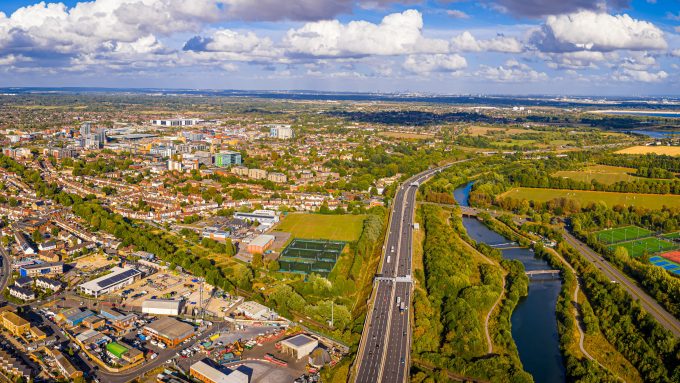
Inclusive Innovation championed in the West Midlands

“There's space for different ideas and different voices, and by working together we can make programmes more inviting for more businesses,” says inclusion champion Karolina Medwecka from Birmingham City Council.
Karolina is working with Connected Places Catapult to develop accelerators focused on supporting under-represented communities as part of the DIATOMIC Inclusive Innovation programme in the West Midlands.
For her, inclusion is about welcoming new ways of thinking and “giving a seat at the table to people who are not usually part of the innovation ecosystem” including firms run by professionals from different countries, backgrounds, ethnicities and genders, and people living with disabilities.
Karolina is a key partner in a collaboration between Aston University, Birmingham City Council and the Catapult to support businesses from under-represented groups to provide support to develop companies and grow businesses through innovation. For many firms being supported, there is an opportunity to strengthen themselves in the health and med-tech markets.
She is particularly keen to ensure that local businesses led by a diverse range of people get a chance to shine. They are, as she puts it, the ones who “touch the communities, who can then provide instant feedback to what you are doing.” Local engagement, she adds “is where the magic happens”.
Encouraging small enterprises that are representative of local populations to get involved in regional growth programmes also allows communities to affect change more readily, she says. “Sometimes when interventions are designed at a national level, they are too far removed from seeing the impact of decisions. But the best way to deliver regional programmes is working in partnership with local people and businesses.
“It is through inclusive innovation where change happens; by taking risks, trying new things and listening well.”Karolina Medwecka from Birmingham City Council
Focusing on clean and health tech
To see what local businesses led by a diverse group of professionals can achieve, 20 entrepreneurs have been welcomed by Karolina and Connected Places Catapult on two programmes: the Diverse Innovation Accelerator and Access to Market Opportunities for Health/Med Tech Accelerator.
“We received over 80 expressions of interests, and from these we selected a smaller group to work with to test their abilities, skills and compatibility,” she explains. “Eventually several of them will be invited to become part of the consortium.”
DIATOMIC is currently looking to promote inclusive innovation in many sectors. The accelerators provide an opportunity to demonstrate how leaders of businesses from under- served groups can be provided with support to grow, diversify, innovate and scale.
Companies involved include businesses working on healthcare systems optimisation, use of virtual reality in jewellery production and marketing, as well as companies producing a variety of new digital tools and apps. Karolina also points out that during the pandemic, many small companies were quicker to pivot to new markets compared to larger rivals; such as large healthcare firms.
Next year, Connected Places Catapult will look to further embed Inclusive Innovation in the West Midlands, continue to develop tools and resources to respond to the needs of business leaders from diverse groups, and promote inclusion in all aspects of the innovation process and decision making.
Karolina also hopes to identify different ways of innovating around service delivery, and to ensure that what innovators provide locally, delivers for the needs of communities, especially in the health tech and mental health sectors.
“The public sector must be able to support entrepreneurs that think about impact and provide solutions to problems, as opposed to solely focusing on what's going to sell,” she adds, adding that when public budgets are tight all too often companies that offer better value for money can take precedence over those focused on delivering innovation for local good.
“If your customer base is close by, and you can have that personal relationship with what you are producing, that’s an entirely different business model that keeps us accountable for the impact we are creating” she adds. “We are innovating and pushing the boundaries of not only what's possible but also what the impact of our innovation is.”
Making innovation accessible to all
Successful local firms are often driven by wanting to find answers to problems, rather than chasing profits, she adds. “They recognise that there is more to innovation than promoting a widget or a technical innovation; it’s about a different way of thinking.”
In five years, Karolina wants to see inclusive innovation delivered as part of business as usual. “This is just the start of the collaboration; we look forward to building more,” she says.
Connected Places Catapult’s Inclusive Innovation Manager, Andy Cleobury says that everyone should feel comfortable innovating; from generating ideas to delivering products. “The goal is simple yet profound: to make innovation accessible to all; creating a future that is both inclusive and equitable, with a diverse set of ideas, skills, and perspectives.
“When we bring diverse voices and perspectives into innovation, we create solutions that are more reflective of society’s needs,” he adds. “It helps to bridge gaps in economic and social opportunities, fostering a culture where innovation becomes a tool for addressing systemic challenges and driving positive change for all.
“Ultimately, inclusive innovation strengthens communities, economies, and the very fabric of our future.”
Read about the impact firms involved in year one of the DIATOMIC UK Accelerator have had in the West Midlands.





